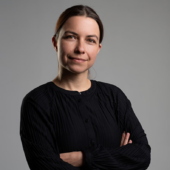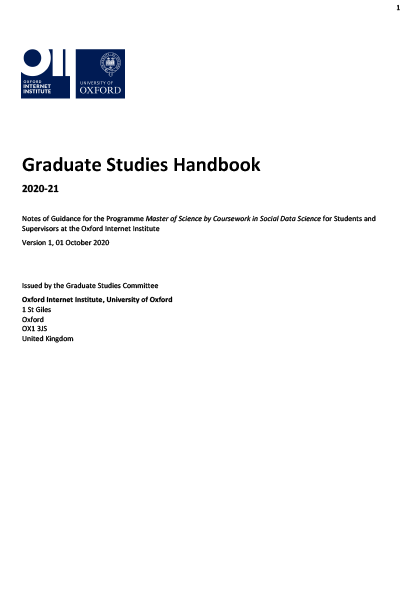

University of Oxford
Online doctorate programs found in world's top 500:.
Research degrees
As one of the world's leading research institutions, Oxford University is committed to recruiting highly qualified and talented research students to its research degree programmes, and to providing a stimulating and supportive research environment for them to flourish in. It is also eager to foster research collaboration and to build partnerships across departments within the university and with other research institutions and with industrial and commercial partners.
At Continuing Education we have established a lively and expanding research community for part-time doctoral students working both in Oxford and at a distance. In some cases, our DPhil programmes have been developed in partnership with other university departments and with external institutions. All offer the opportunity to acquire a rigorous training in research methods, to work alongside other exceptional researchers in related fields and to access the exceptional physical and intellectual resources of Oxford.
A DPhil (known as a PhD in some institutions) is an advanced research degree awarded on the basis of a thesis and an oral examination called the viva voce. The thesis must be a significant and substantial piece of research, make an original contribution to its field, and be presented in a lucid and scholarly manner. In the viva, the candidate is required to defend their thesis and to demonstrate a good general knowledge of their field of study.
Part-time students normally take six to eight years to research, write and submit their theses for examination. The minimum period for submission is four years. (The Department does not currently award MPhil degrees.)
We welcome applications from high-calibre candidates able to demonstrate commitment, intellectual rigour and tenacity. We take into consideration both academic qualifications and relevant professional experience.
Postgraduate courses
Research degree listing
All course listing
Search tool

Graduate School
Applying for a research degree, research methods and skills.
On our graduate course pages you'll find essential information about each department and the courses they offer, to help you to narrow your focus to a particular course.

Choosing a course
An overview of the types of graduate course available at Oxford, from doctorates to diplomas.

A-Z of courses
A comprehensive A-Z of Oxford's graduate courses. Filter by course type and search by keyword.

Courses by department and division
Explore our graduate courses by department or by academic division.
Course finder

This is Graduate Oxford
The University has an international reputation for world-leading research, teaching and resources, and combine this with a beautiful and historic city, it is alive with activity, attracting students from all over the world.

Open days and events
Talk to our staff and students at events in Oxford, across the UK and worldwide.

Can't find what you're looking for?
If you have a query about graduate admissions at Oxford, we're here to help:
Ask a question
Privacy Policy
Postgraduate Applicant Privacy Policy
- OII >
DPhil in Information, Communication and the Social Sciences

Page Contents
Key information, student experience, supervisors, fees and funding.
The DPhil programme in Information, Communication and the Social Sciences provides an opportunity for students to pursue cutting-edge research into the societal implications of the Internet.
As a doctoral student at the Oxford Internet Institute, you and your peers will address research questions from across the spectrum of disciplines, drawing on our multidisciplinary faculty and on the complementary strengths of your cohort of peers, who are building on literature from different disciplines to answer their research questions.
We are looking for academically excellent candidates who display the potential and enthusiasm necessary to perform research that will make a difference — to ask important questions and to adopt innovative methodologies and approaches for exploring those questions.
Our DPhil students research spans a wide range of topics, normally linked to one or more of our Research Labs, Groups and Research topics .
This system allows doctoral students to dig deeply into disciplinary questions in, for instance, politics or sociology, while also being able to place these questions into a broader picture of how the Internet can be theorised and researched.
Over the course the programme, you are expected to produce an important and original piece of scholarship that will make a significant contribution to the dynamic area of Internet research. On completion, you will have the qualities and transferable skills necessary to excel in teaching, research, policy-making or business.
Whilst every doctoral project will follow a unique path, broadly there are three stages:
- Formulating a research question: You will focus on developing your research questions, and research skills. All doctoral students are required to take two courses which give the necessary foundation for undertaking research in this multi-disciplinary field.
- Gathering data: You will outline the structure of your thesis, this includes data gathering, and might include a period of fieldwork away from Oxford. Many students also use this time to start drafting journal articles, often in collaboration with their supervisors.
- Writing up your thesis and submitting: You will concentrate on any final data gathering, and writing up the final chapters for submission of your thesis.
In addition to the formal requirements of the DPhil thesis, all doctoral students receive regular training in the key graduate skills necessary to support their research and future employment. These range from classes on specific tools or skills such as programming in Python or using content analysis software, to more generic training such as presentation skills, academic writing and peer review.
We also provide opportunities for DPhil students to gain teaching experience through mentored assistantship roles in some of the MSc courses. There are also opportunities for taking part in organising student-run conferences dedicated to sparking exchange between disciplines and showcasing emerging Internet research.
Learning Outcomes
On completion of the DPhil programme, it is expected that you will have developed your knowledge and understanding of:
- The application of one or more of the social sciences to a detailed study of the Internet and related information and communication technologies and their societal implications.
- Practices and technologies relevant to the Internet and related ICTs.
- Theories and techniques of social sciences research applicable to the field of information and communication and of emerging technologies in particular.
- Modes of communicating and applying research in the field of information and communication to such issues as the design of new technologies and the formation of public policy.
- The qualities and transferable skills necessary to excel in teaching, research, policy-making or business in your studied field, including abilities to design new technologies and to predict and analyse their impacts.
- Leading-edge research methods relevant to investigating emerging information and communication technologies in the social sciences.
How To Apply
All applications must be made through the University of Oxford Graduate Admissions site . Please ensure that you start the online application process as early as you can, to ensure plenty of time to complete your application. We particularly advise applicants to contact their referees as early as possible, and register their details in the draft application form well in advance of the deadline.
Both the full-time and part-time DPhil programmes have one application deadline in January. Only applications that are complete by the deadline, including receipt of references, can be considered by the admissions team.
The Oxford Internet Institute is part of the University of Oxford’s pilot on selection procedures which aims to explore actions aimed at better contextualising admissions procedures for graduate students while minimising conscious and unconscious bias. For all our courses, the socio-economic data you provide in the application form will be used to contextualise the shortlisting and decision-making processes. For details about the pilot and the actions we are taking, please see the University’s page on the Pilot selection procedure.
- Full-time: 3-4 Years
- Part-time: 6-8 Years
Start date:
- October 2025
12 noon UK time (midday) on:
- Thursday 9 January 2025

Professor Carl-Benedikt Frey
Dieter Schwarz Associate Professor of AI & Work
Carl-Benedikt Frey is the Programme Director of the DPhil in Information, Communication and the Social Sciences.

Laura Maynard
DPhil Coordinator
Laura is the DPhil Co-ordinator, and administrates the course.

Our induction programme is usually held in the first week of October, the week preceding the start of Michaelmas Term (also referred to as 0th week). During Induction Week students will be formally introduced to the OII’s Director, Director of Graduate Studies, Programme Directors, Graduate Studies Support team, as well as our faculty and administrative team. In addition students will be offered a full tour of the OII’s facilities and introduced to IT and library resources, followed by several informative DPhil induction sessions. There is also ample opportunity to get to know fellow students and staff through student-led social activities and an afternoon drinks reception. During October the Social Sciences Division also holds a welcome event for all new research students.
Our doctoral students are provided with hot-desk working space in the department. We are equipped with advanced video conferencing facilities and high-speed network access. The OII’s library specialises in the social sciences, technology and computing, and our students also have access to the Bodleian Libraries, the University’s main research library.
Opportunities for teaching and training
We provide opportunities for DPhil students to gain teaching experience through mentored assistantship roles in some of the MSc courses. Students will have the opportunity to attend the Introduction to Learning and Teaching at Oxford programme run by the Social Sciences Division, an interactive and discursive course in which attendees will explore common teaching formats (lectures, small groups, tutorials) and common experiences (for example, group management, preparation, presentation and delivery). Students must complete this programme if they wish to undertake a teaching assistant position at the Oxford Internet Institute.
Pastoral and Welfare Support
In addition to the pastoral support provided your college, as a department the OII seeks to support students by various means. Each degree programme has dedicated administrative support and the administrators in question will be able to help and advise students on a range of matters relating to welfare or academic matters, or point them towards dedicated sources of support elsewhere in the University. Supervisors and the Director of Graduate Studies can also serve as a source of support, in addition to our dedicated disability lead and several Harassment Officers who can assist with connecting students with the appropriate support.
Whilst every doctoral project will follow a unique path, there are common milestones that every DPhil student must pass. The information below gives a broad indication of the general milestones, but all students are advised to discuss the timeline with their supervisor.
During the programme you will move through three different stages:
- Probationer Research Student (PRS)
- DPhil Status
- Confirmed DPhil Status
DPhil Milestones
(You can find detailed information on scheduling in the OII DPhil handbook.)
Stage 1: Formulating a Research Question
Stage 1 takes place over Year 1 for full-time students and Years 1 and 2 for on the part-time programme.
All doctoral students are required to take courses which give the necessary foundation for undertaking research in this multi-disciplinary field. Both courses must be passed in order to transfer from PRS to DPhil status.
- Advanced Social Theory provides an overview of the major findings to date regarding the social implications of the Internet, drawing material from several social science disciplines, including communication studies, sociology, and political science.
- DSR Methods Core and DSR Statistics Core provides students with the core skills, methods, theories and concepts required to undertake the remainder of the degree. It examines issues concerning the application of traditional social research methods to the study of emerging ICTs as well as the use of new methods, enabled by the Internet and ICTs, in the study of an array of social research problems.
If you come from a background outside the social sciences (e.g. in computer science), you may be asked to take appropriate courses in theory and methods offered by the OII or one of the University’s Social Science Division departments during your first year of doctoral studies.
DPhil students are also welcome to take any of the OII MSc Option Papers , with the approval of their supervisor and the course provider.
In addition to these classes, students will be required to work on their thesis, and will meet regularly with their supervisor to this end. By the end of this stage, students will be expected to have formulated clear research questions and identified appropriate theoretical and methodological frameworks for addressing these questions.
Transfer of Status
As most students will enter the DPhil programme as Probationer Research Students (PRS), they will be expected to gather materials and draft a research proposal for transfer to DPhil Status between their third and fourth term in Oxford. Assuming the normal three-year programme, we expect students to complete the transfer interview by the end of their fourth term. Most students successfully transfer in the third term.
Stage 2: Gathering Data
Stage 2 usually occurs in Year 2 for full-time students and Years 3 and 4 for students on the part-time programme.
This stage of the DPhil will normally be devoted to data gathering and mapping the outline structure of your thesis. However, students will also need to make significant progress in writing their thesis, drafting at least two chapters in preparation for the Confirmation of Status milestone. This may include a period of fieldwork away from Oxford. Many students also use this time to start drafting journal articles, often in collaboration with their supervisors.
Confirmation of Status
Confirmation of DPhil Status is an essential stage on the way to the doctorate and confirms that the student is capable of producing a thesis of the necessary standard and within an appropriate timescale. It is not possible to submit a thesis for examination until DPhil status has been confirmed.
The OII’s Graduate Studies Committee expects students to complete the confirmation interview by the end of their third year for full time students; and by the sixth year of study for part-time students.
Stage 3: Writing Up and Thesis submission
Stage 3 usually occurs in Year 3 for full-time students and Years 5 and 6 for students on the part-time programme.
Stage 3 will concentrate on any final empirical work, and on writing up the final chapters for submission of the thesis. The thesis must be submitted within four years (full-time) and eight years (part-time) from the date of admission as a graduate student. In special circumstances, you may apply for an extension of time through the Graduate Studies Committee. The maximum extension permitted is two years, making six years (full-time) or ten years (part-time) of study in all.
Once the thesis has been submitted, two examiners are appointed and the examination by viva voce (an oral defence of the thesis) is scheduled.
As a graduate student you will be assigned an academic supervisor, who is responsible for your academic well-being and progress. In addition to academic supervision, you will also have a college advisor who can help with issues of student support and welfare.
You should expect to meet with your supervisor at least three to four times a term. In the early stages of your doctoral studies your supervisor will assist you in settling into the pace of academic life, help you identify your training needs in order to fulfil your research and facilitate appropriate networking across the University. As your research progresses, your supervisor will advise you on research design, provide guidance on any data collection, and comment on your written drafts. In the final stages of your doctoral studies, your supervisor will provide comments on your thesis drafts and help you prepare for milestones and the final examination of the thesis. Your supervisor may also provide career guidance as you plan your future beyond your period of study.
The following OII faculty members are eligible to supervise DPhil students.

Dr Adam Mahdi

Professor Andrew Przybylski

Professor Bernie Hogan

Professor Brent Mittelstadt

Professor Chris Russell

Professor Ekaterina Hertog

Professor Greg Taylor

Dr Janaki Srinivasan

Professor Joss Wright

Professor Kathryn Eccles

Dr Luc Rocher

Professor Mariarosaria Taddeo

Professor Mark Graham

Dr Mohsen Mosleh

Professor Ralph Schroeder

Dr Robert Prey

Professor Sandra Wachter

Dr Scott A. Hale

Professor Victoria Nash

Professor Viktor Mayer-Schönberger

Professor Vili Lehdonvirta
Details of fees, living expenses, and definitions of home and overseas students, together with information about potential sources of funding are available from the University’s Fees and Funding website.
There are a number of sources of funding for postgraduate students at Oxford. Details of all scholarships for which candidates may be eligible can be found on the University’s Fees and Funding website. The scholarships are all highly competitive and are awarded on academic merit.
Clarendon Scholarships
Clarendon is one of the biggest of the University’s scholarship schemes, offering around 170 new scholarships each year to academically outstanding graduates. Clarendon scholarships are competitive, prestigious and highly sought-after. As well as providing for fees and living costs Clarendon aims to enhance the Oxford experience by offering students the chance to form lasting social, academic and professional networks. Students can apply by completing the funding sections of the graduate admissions form. As part of the admissions process, the Oxford Internet Institute Scholarship Committee will decide which applicants to nominate to the University for consideration. Further details of this scholarship can be found on the University’s Clarendon Scholarships page.
Economic and Social Research Council (ESRC) funding
The ESRC is the UK’s largest organisation for funding research on social and economic issues. The University, in collaboration with Brunel University and the Open University, hosts the Grand Union Doctoral Training Partnership (DTP).
The Oxford Internet Institute’s graduate degree programmes are a recognised doctoral training pathway in the partnership and our Digital Social Science pathway is provided through two routes, MSc-to-DPhil (known as 1+3) and DPhil-only (known as +3), and is available to students studying part-time as well as those studying full-time.
In order to be considered for a Grand Union DTP ESRC studentship, you must select ‘ESRC Grand Union DTP Studentships in Social Sciences’ in the University of Oxford scholarships section of the University’s graduate application form. You must complete a Grand Union DTP Application Form and upload it, together with your graduate application form, in order to be considered for nomination for the studentship.
Information about ESRC studentships at Oxford can be found on the Grand Union DTP website . Please ensure you have read all of the guidance available on the website before completing the ESRC Grand Union DTP Studentship Application Form . Questions can be directed to the Grand Union DTP Office at [email protected]
ESRC studentships are open to both Home (UK) and International candidates, read more about the eligibility criteria here .
Arts and Humanities Research Council (AHRC) funding
The AHRC provides public funding in support of research into the arts and humanities, for approximately one quarter of the UK’s research population. Oxford participates in the Open-Oxford-Cambridge AHRC Doctoral Training Partnership, providing a number of scholarships each year to students working in eligible subject areas across the Humanities and Social Sciences Divisions.
Information about applying for AHRC scholarships at Oxford can currently be found on the Open-Oxford-Cambridge Doctoral Partnership website. In order to be considered for a studentship you must apply by the programme deadline and tick the relevant box in the studentships section of the application form. You will also need to complete the OOC DTP Application Form and upload it as an additional document when completing your application.
Black Academic Futures scholarships
The Black Academic Futures programme offer scholarships to UK Black and Mixed-Black students starting doctoral study at Oxford. A pplicants need to apply to an Oxford department by the relevant programme deadline to be considered for the scholarship and ensure they include the ethnicity information in their application.

Refugee Academic Futures
The Refugee Academic Futures scheme offers financial support to pursue graduate study at Oxford to students who are refugees or other people with lived experience of displacement. The scholarships are open to all academic subjects. Each scholarship will cover your course fees and will provide you with a grant for living costs. Awards are made for the full duration of your fee liability for your course. Scholars will be offered opportunities to receive mentoring and a bespoke programme of pre-arrival and on course support.
Care-Experienced Academic Futures
The Care-Experienced Academic Futures scholarships offer financial support to students who have experienced being in care in the UK to pursue graduate study at Oxford. The pilot will include the inaugural award of the Oxford-Rees Graduate Scholarship, which supports care-experienced Social Sciences candidates.
OII Shirley Scholarship
The OII awards a limited number of DPhil Scholarships each academic year supported by the Shirley Scholars Fund which was established in honour of OII founder donor Dame Stephanie Shirley. These scholarships are open to both full- and part-time students (from any country) and all applicants who are offered a place on our programme are automatically considered for an award. Scholarships are awarded on the basis of merit.
OII Doctoral Studentship on AI, Privacy, and Public Interest Technology
The Oxford Internet Institute is awarding a fully-funded doctoral studentship on AI, privacy, and public interest technology, covering course fees and stipend for three years, under the supervision of Dr Luc Rocher.
Topics of interest include evaluating the impact of AI and data-centric technologies on society, with a particular emphasis on the impact of privacy-enhancing technologies, such as differential privacy and synthetic data, on social science and healthcare research; human-AI interactions and evaluations of NLP, language models, and recommendation systems; algorithmic fairness, accountability and transparency; algorithm auditing in online platforms and apps.
Advances in AI and machine learning, along with the unprecedented collection of our human traces, have led to growing concerns about the harms and unintended consequences of digital technologies. The rapid deployment of data-centric technologies across entire fields, from online platforms to public sector, is often opaque and accompanied by significant digital and human rights violations.
As a doctoral student, you will learn how to measure the impact of AI and digital technologies on society and how to create human-centred technologies and interventions for the benefit of the public. Depending on your interest, you could work on investigating privacy vulnerabilities, algorithmic harms, or the social and policy implications of AI systems deployed by both public and private organisations. The outcome of your research should inform policymakers, technologists, and civil society about best practices for developing accountable, sustainable, and secure AI systems that protect privacy and serve the public interest.
You will join the Synthetic Society research team led by Dr Luc Rocher. We are looking for candidates who love exploring ideas to discover and create new things, are willing to collaborate with others, and would like to generate impact through their research. Our research has been published in leading journals such as Nature Communications and Science Advances, as well as presented at conferences such as Usenix Security, ACM Web Conference, and NeurIPS, and has been widely referenced in press and public policy, from the EU Commission to the Federal Trade Commission.
We are particularly interested in candidates with a background in computer science, applied mathematics, Human-Computer Interaction, or privacy and security, combined with interests in social sciences, policy, or participatory research. We believe in the importance of diversity in both our research team and the research fields we work in. We aim to create and foster a collaborative environment within the team where everyone feels welcome. The Oxford Internet Institute is committed to enhancing diversity and promoting equality of opportunity, and has been awarded a Bronze Award in the Athena Swan Charter to promote gender equality in higher education.
Award details
The award covers course fees in full and a stipend for three years of at least £19,795 per annum. Please note that this studentship is open to full-time students only.
How to apply
To apply for the studentship you must submit an application to study for either the full-time DPhil in Social Data Science or the full-time DPhil in Information, Communication and the Social Sciences at the University of Oxford by Thursday 9 January 2025. On the application form, in the section headed ‘Departmental Studentship Applications’, you must indicate that you are applying for a studentship and enter the reference code for this studentship 25OII01PRI
Information about both programmes and how to apply can be found on our study pages . Your application should include a research proposal (of up to 2,500 words) indicating how you would engage with the core elements of the call – AI, Privacy, and Public Interest Technology – if offered a studentship. The applicant will be assessed as part of the applicant pool for the relevant DPhil programme.
Prior to applying, interested candidates are encouraged to contact Dr Luc Rocher at [email protected] using the subject “OII DPhil 2025 FIRSTNAME LASTNAME” with a CV and details of research interests.
DPhil Handbook 2024-25
Download the handbook for study at the OII in the academic year 2024-2025

You can find general FAQs about applying to our courses, studying at the OII, and choosing a college on the study FAQs page .
When should I apply?
The DPhil programme has one deadline in January.
Please ensure that you start the online application process as early as you can, to ensure plenty of time to complete your application. Only applications that are complete by the deadline (including letters of reference) can be considered by the admissions team. All applications must be made through the University of Oxford Graduate Admissions site.
How do I choose a supervisor?
Our students are supervised by OII faculty members. Please note that we will only admit students where appropriate supervision is available; please see the full list of faculty members eligible to supervise students on this programme.
Please note that it is strongly advised that DPhil applicants should contact a potential supervisor before they submit an application to check that there is appropriate supervision for their research proposal. Once DPhil applicants have identified an appropriate supervisor they should email them directly with a brief overview of the proposed research topic. The faculty member will then indicate whether they would be suitable to supervise the proposed topic.
If I need to submit English Language Test results, when are they due?
You can read more about the English language requirements for graduate study applications in the graduate application guide. This course requires proficiency in English at the University’s higher level . If you already have English language test scores at the required level achieved within two years of the start of the course to which you are applying, please include them in your application. However, you are not required to provide test scores when you submit your application.
How does the DPhil in Information, Communication and the Social Sciences differ from the DPhil in Social Data Science?
The DPhil in Information, Communication and the Social Sciences is designed for students interested in research about the Internet and related technologies and their societal implications. Theses in this programme might include quantitative, qualitative, computational or mixed methods applied to a broad range of questions about digital phenomena and could address questions about technology policy or practice. The DPhil in Social Data Science is designed for students with core quantitative skills who wish to develop their skills for analysing structured and unstructured data using advanced computational techniques such as machine learning. Theses in Social Data Science might develop new computational approaches for analysing human behavioural data and/or apply such approaches to answer a social science question.
What does a good DPhil application look like? Do you have any examples?
Here is some great advice from OII DPhil alumni Bertram Vidgen on how to write your DPhil application proposal . You can also read OII Professor Vili Lehdonvirta’s advice about picking a research topic for a DPhil application.
What fees do I have to pay?
Course fees cover your teaching, and other academic services and facilities provided to support your studies. They do not cover your accommodation or other living costs. You may have seen separate figures in the past for tuition fees and college fees. We have now combined these into a single figure.
See the University’s guidance on fee status and fee liability for information on Home/Republic of Ireland , Islands and Overseas student classification. As well as covering University and College fees, students will also have to support their maintenance costs. As Oxford is a relatively expensive place to live, it is recommended that students consult the University’s guidance on living costs when planning their budget, to cover accommodation, meals and other living expenses.
Do I have to live in Oxford during my studies?
Full-time students are required by the University’s regulations to be in residence in Oxford during term time. That means a commitment to be in Oxford for at least the full nine weeks of all three terms of each academic year. You also need to be available in Oxford for several events outside full term, from the induction programme to examinations. Research away from Oxford should be discussed with your supervisor. Part-time students are not required to live in Oxford, but are expected to be present in Oxford on average 30 days per year. Please see the DPhil handbook for more details.
Do you offer any intensive, online or distance-learning courses?
We do not normally offer any of our MSc or DPhil programmes in an intensive, online, or distance-learning modality. Although we do make use of virtual learning environments and various other online components of study, both full and part-time students are required to attend in person during term time due to the collaborative and multi-disciplinary nature of our programmes, and the principles that underpin Oxford education as a collegiate university. We strongly believe that the face-to-face element of the programme is vital in providing a multi-disciplinary peer network for students to engage in ideas, discussion and debate.
We do, however, offer this programme on a part-time basis. The part-time DPhil is substantively identical to the full-time degree, but distributes the workload over five to six years for those who must fit study around work, family, or other outside commitments.
What does the schedule look like for a part-time DPhil student?
Part-time students can typically expect to spend at least 30 days physically in Oxford each year, and will be expected to commit approximately 20 hours per week to their studies. Part-time DPhil students will be expected to take core courses in Michaelmas Term of Years 1 and 2, which will mean choosing two courses in one year, and one in the other year. These courses have been scheduled to allow part-time students to take them on a single day, so students will need to be able to attend classes in Oxford one day a week for the eight consecutive weeks of Michaelmas Term, as a minimum. In addition, part-time students will need to be present in Oxford in their first year for the full Induction Week (normally held the first week of October).
There are provisions to attend DPhil seminars and supervision meetings via video conference, the latter at your supervisor’s discretion, particularly from Year 3 onwards. However, classes for the core courses and any corresponding examinations in Michaelmas Term of Years 1 and 2 can only be attended in person.
- Privacy Overview
- Strictly Necessary Cookies
- Google Analytics

This website uses cookies so that we can provide you with the best user experience possible. Cookie information is stored in your browser and performs functions such as recognising you when you return to our website and helping our team to understand which sections of the website you find most interesting and useful.
- moove_gdrp_popup - a cookie that saves your preferences for cookie settings. Without this cookie, the screen offering you cookie options will appear on every page you visit.
This cookie remains on your computer for 365 days, but you can adjust your preferences at any time by clicking on the "Cookie settings" link in the website footer.
Please note that if you visit the Oxford University website, any cookies you accept there will appear on our site here too, this being a subdomain. To control them, you must change your cookie preferences on the main University website.
This website uses Google Tags and Google Analytics to collect anonymised information such as the number of visitors to the site, and the most popular pages. Keeping these cookies enabled helps the OII improve our website.
Enabling this option will allow cookies from:
- Google Analytics - tracking visits to the ox.ac.uk and oii.ox.ac.uk domains
These cookies will remain on your website for 365 days, but you can edit your cookie preferences at any time via the "Cookie Settings" button in the website footer.
Please enable Strictly Necessary Cookies first so that we can save your preferences!

DPhil Finance
Start date:
- 6 October 2025
Time commitment:
About the programme
Our doctoral training will immerse you in all aspects of academic life.
You will be both a student and a junior research colleague. We provide courses in a wide variety of research methods and you will work closely with your supervisors to define your research question and develop your thesis. You will also have opportunities to gain teaching and research assistant experience and become involved with the intellectual community within both Saïd Business School and the wider University. You will attend academic conferences, make presentations, organise lectures and seminars and contribute to management and academic decisions. Both of our doctoral programmes run in parallel, with only differences in taught courses and preparation for writing in relevant journals to your subject of choice. We have deliberately kept the programmes small which means that in the vast majority of cases, students are fully funded to allow them to devote their energies to research. The DPhil corresponds to a PhD degree offered at most other universities. Examples of previous research topics include asset-pricing and corporate finance, the design and regulation of securities markets, corporate financial policy, and the impact of financial markets on real economic activity.
Supervision

You will be assigned two initial supervisors who will guide you through your first year.
They will help you to identify your specialist area of interest and further suitable advisers in that field. You will work closely with them to define your research question and develop your thesis. It is an important relationship and also a very personal one: it is shaped by you, your supervisors and the ways you interact. You will have a minimum of nine meetings, or equivalent per year with your supervisor.
You do not need to contact any faculty in advance of making your application but you can review the profiles of our faculty to look for at the areas of research covered at the School. You can note within your application if you feel that you are interested in a particular research area and working with a specific faculty member.
The allocation of a supervisor is the responsibility of Saïd Business School, it is not always possible to accommodate the preferences of incoming graduate students to work with a particular member of staff. Under exceptional circumstances a supervisor may be found outside the School.

Review some current research taking place around the school as well as from some of our alumni.
Review articles and podcasts written by our researchers at Oxford Answers .
Learn more about becoming a researcher from Andromachi Athanasopoulou, who graduated in 2007 and is now an Associate Professor in Organisational Behaviour at Queen Mary University London and an Associate Fellow at Oxford Saïd.
View Professor Renée Adams' discussion on Women on boards: The superheroes of tomorrow?
View Dr Amir Amel-Zadeh's discussion on (Mis-)information in financial markets .
Assessment and programme milestones
Our DPhil offers students the opportunity to engage with internationally renowned faculty who are here to help you become an academic scholar.
You will initially be admitted to the status of Probationer Research Student (PRS). During your first year, you are required to attend six core modules from the MPhil Economics and Saïd Business School doctoral courses.
MPhil Economics:
- Microeconomics (Core)
- Econometrics (Advanced)
- Financial Economics 1
- Financial Economics 2
Saïd Business School doctoral courses:
- Empirical Finance
- DPhil Finance Professional Development Course
You will also attend two elective courses from the list below. The list includes courses from the second year of the MPhil Economics as well as Saïd Business School doctoral courses.
- Macroeconomics (Advanced)
- Microeconomics (Advanced)
- Behavioural Economics
- Development Economics 1
- Development Economics 2
- Economic History 1
- Economic History 2
- Empirical Microeconomics
- Industrial Organisation 1
- International Macroeconomics and Finance
- International Trade 1
- International Trade 2
- Labour Economics
- Public Economics
- Urban Spatial Economics
- Empirical Corporate Finance
- Empirical Asset Pricing
All students will satisfactorily complete the courses, examinations and coursework as determined by the supervisor and/or DPhil Committee.
After successful completion of all necessary courses and within a maximum of six terms as a PRS student (and normally by the fourth term), you will be expected to apply for transfer of status from Probationer Research Student to DPhil status. A successful transfer of status is required to give a clear indication of whether it would be reasonable to consider submission within the course of a further three terms, if work on the thesis continues to develop satisfactorily. Students who are successful at transfer will also be expected to apply for and gain confirmation of DPhil status within nine terms of admission, to show that your work continues to be on track. Both milestones normally involve an interview with two assessors (other than your supervisor). This provides important experience for the final oral examination. You will be expected to submit a thesis, which provides a significant and substantial contribution to the field of learning in finance, which should not exceed 100,000 words after four years from the date of admission. It should be good enough to be published in book form or as a series of academic articles. To be successfully awarded a DPhil in Finance you will need to defend your thesis orally (viva voce) in front of two appointed examiners.
Changes to this course and your supervision
We seek to deliver this course in accordance with this description. However, there may be situations in which it is desirable or necessary for the us to make changes in course provision, either before or after registration. The safety of students, staff and visitors is paramount and major changes to delivery or services may have to be made in circumstances of a pandemic, epidemic or local health emergency. Also in certain circumstances, for example due to visa difficulties or because the health needs of students cannot be met, it may be necessary to make adjustments to course requirements for international study.
Where possible your academic supervisor will not change for the duration of your course. However, it may be necessary to assign a new academic supervisor during the course of study or before registration for reasons which might include illness, sabbatical leave, parental leave or change in employment.
For further information please see our pages on changes to courses and the provisions of the student contract regarding changes to courses.
I think the most important issues in the supervisor relationship are communication and trust. You need a supervisor who can tell you the things you need to hear even if you don’t want to hear them, and who can nudge you back on to the right track. Alexander Montag Current DPhil in Finance student
Benefits and opportunities
- Engage with internationally renowned faculty
- Conference and research funding
- Training in principal research methods at both at Saïd Business School and wider University.
Opportunities
- Paid teaching and research assistant opportunities
- Contribute to management and academic programme decisions through student representation on committees
- Postgraduate careers resources

You will become a member of an Oxford college. Your college is both an academic and social community that will enrich your time at Oxford. It offers everything from formal dinners and balls to sports and lecture series.
The Oxford college system enables you to interact with students and faculty from other disciplines. Some colleges provide accommodation for students.
Who can apply
Our candidates are passionately intellectual people who have a superlative academic record and are committed to a career in academia.
DPhil in Finance
You will require:
- a good undergraduate degree: 2.1 (GPA 3.5 or its equivalent)
- GMAT or GRE test results
- TOEFL or IELTS test results (If you are not from an English speaking majority country)
- three pieces of written work, including a well-developed research proposal
- three academic references
- £20 application fee
Application process

Applications for October 2025 entry closed on 13 December 2024.
Complete applications received by the deadline will be considered. You will be informed by late January if you have been shortlisted for interview.
Final decisions will be communicated by the end of February.
There are nine shared places available for the DPhil Finance and DPhil Management. The average number of applications for entry between 2021 and 2023 was 70.
Fees and funding
The course fee in 2025-26 is £25,160 for both home and overseas students.
The programme is four years in duration. Course fees are payable each year, for the duration of your fee liability (your fee liability is the length of time for which you are required to pay course fees). Please be aware that fees will usually increase annually. For details, please see our guidance on changes to fees and charges .
Course fees cover your teaching as well as other academic services and facilities provided to support your studies. Course fees do not cover your accommodation, residential costs or other living costs.
Following the period of fee liability , you may also be required to pay a University continuation charge and a college continuation charge. The University and college continuation charges are shown on the Continuation charges page.
Additional cost information
There are no compulsory elements of this course that entail additional costs beyond fees (or, after fee liability ends, continuation charges) and living costs. However, depending on your choice of research topic and the research required to complete it, you may incur additional expenses, such as travel expenses, research expenses, and field trips. You will need to meet these additional costs, although you may be able to apply for small grants from your department and/or college to help you cover some of the expenses.
Scholarships and funding
Doctoral students admitted to our programme receive full funding over four years. This includes course fees and an annual living expenses stipend. To maximise the overall availability of funding for candidates, we will identify suitable alternative scholarships and may ask you to submit funding applications. We also ask that you identify and pursue any other funding opportunities, including external funding.
For some scholarships you are required to submit a scholarship essay and/or tick the relevant box in the Funding section of the application form.
Cost of living
In addition to your course fees, you will need to ensure that you have adequate funds to support your living costs for the duration of your course. Please view the University's living expenses page for information about likely living costs for 2025-26.
Further information about fees
The Fees and Funding section of The University of Oxford's website provides further information about course fees , including information about fee status and eligibility and your length of fee liability .
Alumni placements
- University of Michigan Ross School of Business – Assistant Professor of Finance
- Vanderbilt University – Assistant Professor of Finance
- Ivey Business School - Assistant Professor in Finance
- University of Warwick - Assistant Professor of Entrepreneurship and Innovation
- International Monetary Fund - Economist (Economist Program), Research Department
- Harvard Business School - Post-Doctoral Fellow
- University of Hong Kong - Assistant Professor of Finance
- Vrije Universiteit Amsterdam and Tinbergen Institute - Assistant Professor of Finance
- Federal Reserve Bank of Cleveland – Research Economist
- Indiana University – Assistant Professor of Finance
- City University of Hong Kong - Assistant Professor
- Please contact us if you have any queries.
- [email protected]

IMAGES
COMMENTS
Oxford University qualifications. The Department offers a number of part-time undergraduate and postgraduate qualifications. All are designed for the specific needs of adult learners and many can be studied mostly, or entirely, online.
We offer a unique experience to our graduate students, including the opportunity to work with leading academics and with world-class libraries, laboratories, museums and collections. The Graduate Admissions pages of the University of Oxford website are designed for those applying for postgraduate study at the University of Oxford during the 2024-25 academic year.
Online Doctorate Programs Found in World's TOP 500: ARWU Rank: 7. University offering the Online Doctorate Program: University of Oxford. Established: 1096 ... University offering the Online Doctorate Program: University of Oxford. Established: 1096 Country: UK. Part-time. Online Doctorate Program Name: DPhil in Literature and Arts.
Your choice of college is up to you, and does not affect the academic viability of your application to the DPhil itself. A number of Oxford colleges accept applications from part-time postgraduates, whereas others do not: please consult the graduate prospectus or enquire with individual colleges. (Even if you are accepted onto the degree ...
Flexible Oxford qualifications. The Department offers a number of part-time undergraduate and postgraduate qualifications. A ll are designed for the specific needs of adult learners and many can be studied mostly, or entirely, online.. Our distance learning programmes are listed below.
Join us in Oxford or online. Our open-access short courses include day events, weekly learning classes and summer schools. Learn more about our short courses. Academic credit. ... Research degrees. A DPhil (known as a PhD in some institutions) is an advanced research degree awarded on the basis of a thesis and an oral examination called the ...
Alex Connock - Alex is an Oxford academic in the media business and author of the 2022 book Media Management and Artificial Intelligence: Understanding Media Business Models in the Digital Age, plus the 2024 follow-up title Media Management and Live Experience: Sports, Culture, Entertainment and Events.. Alex is Senior Fellow at Saïd Business School, teaching Marketing and Media Business ...
On our graduate course pages you'll find essential information about each department and the courses they offer, to help you to narrow your focus to a particular course. Choosing a course An overview of the types of graduate course available at Oxford, from doctorates to diplomas.
The Oxford Internet Institute's graduate degree programmes are a recognised doctoral training pathway in the partnership and our Digital Social Science pathway is provided through two routes, MSc-to-DPhil (known as 1+3) and DPhil-only (known as +3), and is available to students studying part-time as well as those studying full-time.
Our doctoral training will immerse you in all aspects of academic life. ... The Fees and Funding section of The University of Oxford's website provides further information about course fees, ... International Monetary Fund - Economist (Economist Program), Research Department; 2020. Harvard Business School - Post-Doctoral Fellow;